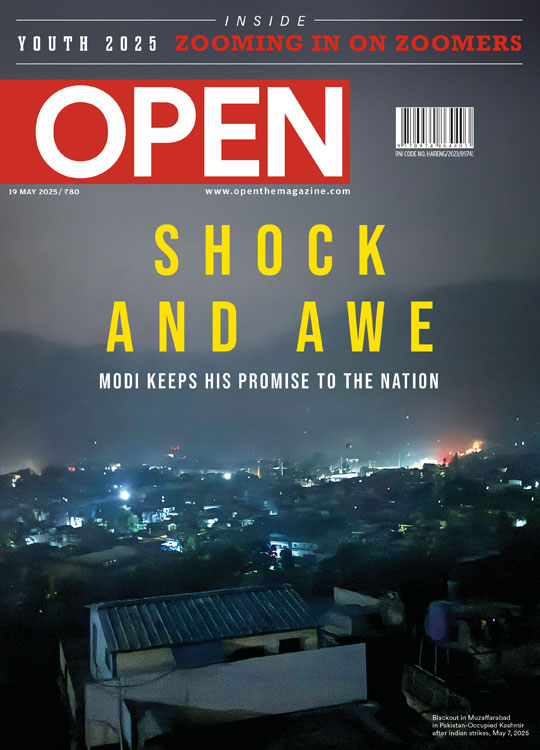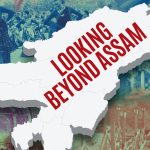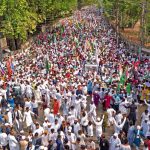Cow Vigilantism: Politics of the Sacred and the Profane
What cow vigilantism has done to undefended lives and livelihoods. Ullekh NP visits Alwar in Rajasthan and Jaisinghpur in Haryana to find out. Photos: Ashish Sharma
/wp-content/uploads/2017/04/Sacred1.jpg)
JAISINGHPUR IS A forlorn village in Haryana’s Mewat region bordering Rajasthan where 24-year-old Irshad Khan sits crestfallen in a tent erected just outside his home. His seven siblings have joined his mother and grandmother in mourning the brutal death of their 55-year-old father at the hands of cow vigilantes earlier this month. Like Bishada near Dadri town of Uttar Pradesh two years ago, this Muslim-dominated hamlet is now in the news for all the wrong reasons. Bishada was where Mohammed Akhlaq was lynched by a mob over suspicions of storing beef in his refrigerator on the night of September 28th, 2015. Jaisinghpur near Nuh town is home to Pehlu Khan, Irshad’s father, who died in hospital two days after he was mercilessly assaulted near Jaguwas Chowk in Rajasthan’s Behror, some 90 km from his home, on the evening of April 1st by bike-borne assailants who suspected him to be a cow smuggler. He was returning from a cattle fair via National Highway 8 in Jaipur along with two neighbours and his two sons, including Irshad, after buying three female calves for Rs 45,000.
Azmat Khan, 23, who lives less than a five-minute walk from Irshad’s home, cannot get up from his bed. He is too weak even to shoo off the flies on his bed sheet. When he tries to speak, he can’t raise his voice beyond a loud whisper. He was with Pehlu Khan in a Bolero pick-up van they had hired to get their cattle—Azmat had bought three cows for Rs 75,000—back home from the fair. In the other pick-up van, which they had borrowed from a friend back in the village, Irshad was behind the wheel; with him were his brother Arif and a relative Rafique who arrived at Jaguwas Chowk only 10 minutes after the vehicle of Azmat and Pehlu was intercepted by gau rakshaks. Their vehicle’s driver, Arjun Meena, is captured on a video clip of the incident saying that he is Hindu and being let off by the attackers. The clip has since gone viral on social media. Azmat, caught by surprise, remembers showing “the 8-9-member group” papers that allowed them to transport their livestock purchases. “They tore the papers. I had on me other documents to prove the buys from a fair run by the government of Rajasthan, but before I knew it, I received blows with sticks and belts, and soon fell unconscious…,” murmurs Azmat with difficulty. His older brother Yousef interjects to say that he is in excruciating pain. His face shows it, adds his father Suleiman, no less distraught. “In the past, things were different… We are being targeted now only because we are Muslims,” he says, his voice heavy with sadness.
Azmat recalls that when he regained consciousness, he was in a hospital and could hardly move his limbs. “I take more than five tablets and have to take injections every day to keep going. Things are getting better slightly, but it might take many more weeks before I can actually walk,” he says. The young father of a one-year-old girl notes that his and Pehlu Khan’s money was taken away by the mob, along with the cattle. “I had more than [Rs] 35,000 with me … they also took away Pehlu’s cash,” he states, adding that he found out about his neighbour’s death many hours after the man had succumbed to his injuries. He then gestures to his father to bring the receipts of their payment at the cattle fair. Asked if he remembers the number of the vehicle he had hired, he says, “I just remember it was a Bolero pick-up van of Rajasthan registration whose last four digits are 7209.”
Various reports have surfaced from states such as Haryana and UP where vigilantes work in tandem with the police and profit by selling cows they snatch from cattle transporters
The Rajasthan Police, instead of going after the attackers—according to a report in the Indian Express—have registered an FIR against them for ‘illegally’ transporting cattle ‘for slaughter’ and not being in possession of purchase receipts on the complaint of a certain Damodar Singh, who the villagers say was merely a bystander. “We are not in that business,” says Yousef, “We are in the dairy business. How can anyone cover the cost of the buy [Rs 75,000] by selling the meat [of three cows]? We do not know of such people. Besides, those people who do doh number kaam [illegal cow smuggling] would be armed and the mobs can’t go anywhere near them. Would such people use national highways and an open pick-up van?” Rahul Prakash, Superintendent of Police at Alwar, didn’t respond to repeated calls, texts and emails from Open enquiring about attacks on dairy traders, including the one on Pehlu Khan and four others.
No one that Open met in Jaisinghpur is aware of the recent demand made by Mohan Bhagwat, chief of the Rashtriya Swayamsevak Sangh (RSS), parent body of the ruling BJP at the Centre, for a nationwide ban on cow slaughter. Locals here are upset, however, that no BJP leader has visited them with condolences so far. “Opposition leaders have come, those from the Congress and some Communists,” says Irshad, “but nobody from the ruling party of Vasundhara Raje has come to commiserate our loss.” Azmat says that letters have been sent to Raje but have got no response. The Rajasthan Chief Minister’s tweet of grief around the time, he is not aware, was over the death of three people in Stockholm, Sweden.
Azmat’s elder brother Yousef is less concerned about gestures of solidarity. “But [Raje] should treat us also as fellow citizens and subjects of her state,” he says, adding that state Home Minister Gulab Singh Kataria was wrong to equate the Alwar victims with perpetrators as being equally at fault. Kataria, who had blamed both sides for the violence, later said that Khan and others didn’t have valid papers. “Apart from a Sub-Divisional Officer (SDO), no one can authorise anyone to transport cows,” he said in response to a query by the Centre, which had been asked by the Supreme Court on April 7th to reply within three weeks why there had been a rise in cow-vigilante crimes in such BJP-ruled states as Rajasthan, Haryana, Gujarat, Madhya Pradesh, Uttar Pradesh, Chhattisgarth and Maharashtra. Kataria also denied that the law-and-order situation in the state has worsened over the past several months. In an interview on the Alwar incident, he said, “There were some people who thrashed him and when the police reached the spot, they ran away. It was the police who admitted him to hospital and on the same day registered the case under Section 308, attempt to murder. And when he died, we converted the case to Section 302.” So far, only four people have been arrested for the attack. The mob had swelled by the time Irshad and others reached the spot on NH8. They were also beaten up.
While BJP leaders Open spoke to in Rajasthan and elsewhere contend that neither the party nor the RSS has anything to do with vigilantism, others, including political pundits, argue that cow-protection gangs also run extortion rackets—demanding money even from those who legally transport buffaloes and cows—in many parts of UP, Haryana, Rajasthan and Madhya Pradesh. A senior RSS leader who has for years worked in MP says that the rise of gau rakshaks is a response to long years of cow smuggling by certain groups. “Many parts of UP, Rajasthan and Haryana, especially the Mewat region, have been known for rampant smuggling of cows from roads and other places for slaughter,” he alleges. He concedes that statements by top RSS functionaries and BJP leaders like UP Chief Minister Yogi Adityanath, who is infamous for incendiary speeches, may have emboldened those committed to the well-being of cows. He hastens to add, “But then there is no excuse for killing dairy farmers mistaking them for smugglers.”
Shashi Tharoor, Congress leader and lawmaker, calls such vigilantism that cripples an industry and upturns so many people’s lives ‘unacceptable and unforgivable’. “A civilised state under the rule of law does not allow mobs to take the law into their own hands,” he tells Open. “Where cow slaughter is illegal, it is the police’s job to apprehend wrongdoers. Where cows are being transported legally, the conduct of lynch mobs is inexcusable and must attract condign punishment. All this has been unleashed by the atmosphere generated by the polarisation and chauvinism that the Hindutva movement has openly promoted and the Government has condoned.” He adds, “Our country is too diverse, and too wedded to its political and cultural freedoms, for a nationwide ban on cow slaughter to be desirable or possible. The BJP even campaigns against cow slaughter in the Northeast and in Kerala [where beef is more or less part of the common man’s diet]. Cow protection was certainly one of many issues in the freedom struggle, but disagreements over it led to the Constituent Assembly incorporating a ban on cow slaughter only in the Directive Principles, rather than in the absolute rights and prohibitions enshrined in the Constitution.” In UP, a vast majority of those employed in the worst-hit allied segments of the meat industry, leather goods and tanning, happen to be Dalits and Muslims. Cow ‘protectors’ on the loose have routinely harassed and assaulted Dalits typically employed in collecting cattle skin, resulting in major counter-mobilisations this year, especially in Gujarat.
They tore the papers. I had on me other documents to prove the buys from a fair run by the government of Rajasthan, but before I knew it, I received blows with sticks and belts
Ever since it took over the reins of power from the Congress in 2014, the Narendra Modi-led BJP Government has come under attack over the unchecked rise of the Hindutva loony fringe, the self- styled custodians of the Hindu faith, and their atrocities across the country. In cities such as Mangalore and Bangalore, various outfits such as Sri Rama Sena have wreaked havoc by harassing young men and women at pubs, and in Kerala, an organisation called the Hanuman Sena successfully threatened a scholar, MM Basheer, to stop his column on the Ramayana in Mathrubhumi newspaper. Opposition leaders lost no time in attacking the BJP for allegedly encouraging such zealots rather than restraining them. Not all such criticism is always baseless: after Akhlaq was killed over a rumour that he had stolen a neighbour’s calf and slaughtered it, BJP leaders like Sangeet Som and Union Culture Minister Mahesh Sharma had visited the village and made preposterous statements. Despite an RSS warning on irresponsible comments, BJP lawmaker Sakshi Maharaj, who is known to shoot his mouth off, resorted to the age-old rhetoric that Hindus consider the cow their mother, suggesting thereby that Akhlaq was to blame for his death. Many villagers that Open had spoken to in Bishada after the incident said that the call to attack Akhlaq was made over the microphone of a temple there, the head priest’s opposition notwithstanding.
Since 2014, various outfits have crept out of the woodwork to target those who express dissidence on religious matters. In mid-2015, the nation was shocked when Dr MM Kalburgi, a rationalist scholar, was shot dead at his home in Dharwad, Karnataka, by a man who posed as his student before escaping on a bike. Months earlier, Govind Pansare, a communist, was shot while he was on a morning walk in Kolhapur with his wife, who survived the attack. Investigators linked his killing to that of the murder of rationalist Narendra Dabholkar, who was also killed while out for a walk two years earlier in Pune. In north India, Yogi Adityanath had courted controversy within months of the Modi Government coming to power by exhorting Hindu men to convert Muslim girls in revenge for so-called ‘love jihad’, which, Hindu nationalists allege, is an attempt by Muslims to entrap Hindu women for conversion to Islam. Communal hatred in UP has also been fanned by the likes of Swami Narasimhanand Saraswati offering arms training to young Hindus in ‘defence’ against an unstated but obvious ‘aggressor’.
It was in the run-up to the high-octane campaign for the Bihar Assembly elections of late 2015 that the BJP’s campaign touched new lows. Modi said at his Buxar rally on October 26th, 2015, “[Nitish Kumar and Lalu Yadav] are conspiring to take away 5 per cent reservation of Dalits, Mahadalits, Backwards and Extremely Backwards and give it to a particular community.” The BJP was routed in the Bihar polls, but incurred the opposition’s wrath over what they called outright communalism. Earlier, the RSS and BJP were accused of ‘intolerance’ of alternative views and of replacing Leftist intellectuals with Hindutva sympathisers in key positions of cultural and research bodies.
THE MEWAT REGION, comprising parts of Rajasthan and Haryana, had acquired a bad name over the years for smuggling cows from elsewhere and selling them for consumption in the area, the police say. However, residents refute all this, saying that they are being framed by bigoted politicians and policemen because of their faith. Says Nazar, a dairy farmer in Nuh, “We travel on work to states like UP and Bihar, where buffalo slaughter is allowed. We do legal activities, but even then we are targeted for no reason. Smuggling cows is easier said than done. Even when we transport cattle with permission, we are punished by both the police and gau rakshaks.” In 2015 alone, according to reports, the police closed 73 cases under the Rajasthan Bovine Animal (Prohibition of Slaughter and Regulation of Temporary Migration or Export) Act of 1995, after finding them fake; 85 such cases were dropped last year, and five after that until February 2017. Nazar argues, “The plan is to destroy our livelihood by spreading fear.” Last year, vigilantes forced two men who were transporting beef to drink a cocktail of cow urine, cow dung, milk, ghee and so on. Earlier in Delhi, in late 2015, cops had raided a canteen at Kerala House on complaints filed by a Hindu Sena leader that beef was on the menu there. The issue snowballed into a controversy, though the canteen continues to serve buffalo meat, which is not banned in the national capital.
Hindu nationalists stepped up their cow protection campaign after the BJP won its landslide victory in UP, where religious themes had been a significant part of the vote-canvassing. Led by Amit Shah, the party that had downplayed hardline Hindutva for the General Election of 2014, won 312 of the Assembly’s 403 seats. The party also managed to pull in votes from the aspirational classes and those disappointed with the casteist politics that had dominated the state for more than three decades. With a tireless cow protector like Adityanath now the Chief Minister and the Sangh less discreet about baring a hardline stance, gau rakshaks seem to be taking impunity for granted.
Audrey Truschke, author of a scholarly book on Mughal Emperor Aurangzeb and an expert on medieval India, has closely watched the country’s political dynamics. An India-wide ban on cow slaughter, she believes, is consistent with RSS thinking. Its demand for one “underscores the fundamental intolerance of this paramilitary group that assumes all Indians are Hindus (or rightly should be) and has repeatedly used aggressive tactics, including violence, to achieve its aims”, she says. “That said, an India-wide ban on cow slaughter would be intolerance to a shocking degree. Such a policy would put the world’s largest democracy in league with other nations that enforce narrow interpretations of the majority religion on all of their citizens, such as Iran and Saudi Arabia,” she adds. “It is not surprising that the RSS desires to enforce its narrow version of Hindu practices on all Indians, but it would be shocking and worrisome if the Government enacted such an egregious policy as law.”
Consumption of cow meat, historians say, was acceptable in the Vedic times. This means that pundits aren’t wrong in arguing that a blanket ban upon a culture as diverse as India would be an autocratic measure that does not even have a Hindu consensus. Early scriptures of Manu as well as Yajnavalkya had endorsed the consumption of cow meat to welcome honoured guests. Former Delhi University professor and historian DN Jha has cited the Taittiriya Brahman, which says that ‘Verily the cow is food’ (atho annam via gauh) and Yajnavalkya’s texts that recommend ‘partaking of the tender (amsala) flesh of cows’.
Even later Brahminical texts have evidence that beef was not taboo in ancient times, Jha states. In the therapeutic section of Charak Samhita (pages 86-87), it is prescribed as a medicine for various diseases, he adds. It is also listed as an ingredient for soup and finds emphasis as a cure for irregular fever, tuberculosis and emaciation, the historian says. The fat of the cow is advised for debility and rheumatism. According to Jha’s book The Myth of the Holy Cow, ‘Caraka unhesitatingly recommends a gruel prepared with beef gravy soured with pomegranates as a remedy for intermittent fevers. He is unequivocal in describing the virtues of beef for disorders of wind…’
True, the transformation of rural Indian society in early medieval times—which according to Jha saw an unprecedented agrarian expansion and shrinkage of trade—forced Brahmins of the time to slowly signal their disapproval of beef consumption. Later, even Muslim rulers respected the dietary preferences of a large section of society that eschewed such meat. Truschke, who is currently researching Sanskrit literary histories of Indo- Islamic political events, notes that records show that the Mughals had restricted the slaughter of cows and other animals in specific regions of the empire for limited periods of time. “Both Jains and Brahmins approached the Mughal kings for such political concessions, and numerous farmans (imperial orders) and historical texts survive that attest such requests were granted. For example, Jain monks secured Mughal promises to ban animal slaughter during the festival of Paryushan. Akbar issued two separate farmans on the point, 25 years apart, which suggests that such orders did not remain in effect over the years. Sanskrit texts authored by both Jains and Brahmins lauded numerous Mughal kings for protecting cows, a praise that may have been largely rhetorical but, given farmans prohibit animal slaughter within certain guidelines, also seem to have had some basis in reality.”
As of now, what is at stake amid all the noise and posturing over cow safety—much of it often a mask for extortion—is the fate of India’s buffalo meat industry, one of the world’s biggest. During the UP poll campaign, the BJP had repeatedly fallen back on beef-ban slogans to push its brand of Hindutva politics, and soon after coming to power, the state government has taken steps to close mechanised abattoirs. On current indications, such clamps would severely curtail the country’s exports of buffalo meat and jeopardise the overall meat industry which employs 22 million people, of whom 15 million are in UP. According to data released by the Central Government, buffalo meat exports had already dropped 2.4 per cent in the first 10 months of 2016-17. All this is expected to have an adverse effect on India’s dairy sector as well. Declining economic incentives for cattle rearing caused by new restrictions could have knock-on effects. Milk prices are expected to shoot up as a result of a licence raj imposed on the country’s bovine economy.
MOVASISH SAINI IS the custodian of Alwar’s Sudhasagar Goshala, which houses more than 450 cattle, most of them bulls. Male cattle have become unproductive even for agricultural purposes, thanks to state-offered incentives that farmers can avail of to buy tractors. They can be used as beasts of burden only for a few years. This means most dairy farmers leave their old male cattle at the shelter after paying close to Rs 5,000. Cattle shelters are also run on donations from people; often, extortionists also set up such units to extract money from farmers who end up abandoning their cattle in such places. “These people (gau rakshaks) sometimes sell such cattle for a good sum and hit pay dirt,” Saini points out. Various reports have surfaced from states such as Haryana and UP where vigilantes work in tandem with the police and profit by selling cows and buffaloes they snatch from unsuspecting transporters of cattle. Yousef Khan of Nuh says that such ‘loot’ takes place in the public glare and dairy farmers continue to face the brunt of it, despite having the required papers, even as vigilantes get away scot-free.
“In this particular case, the police have botched up the investigation. Their FIR has only the names of three people and incorrectly stated that Pehlu Khan was travelling in the second vehicle while he was in the first… there are many such discrepancies that we suspect would help only the perpetrators of the crime,” Yousef says.
A short distance away, in Pehlu Khan’s home, his five-year- old son Inshad still hopes that his ‘abba’ will return home soon. Khan’s 80-year-old mother can hardly open her eyes, her severe cataract perhaps a blessing in disguise as unease spreads in the restive plains of Mewat and beyond. In a country where ancient texts dwell at length on instances such as the great sage Bharadvaja welcoming Lord Rama by slaughtering a calf in his honour, the rise of cow vigilantes who use their own narrow interpretations of Hinduism as an excuse to attack others is worrisome not only because of the criminality and inhumanity of their acts, but also because they seem to be getting away with it.
There is nothing holy about it.

/wp-content/uploads/2025/05/Cover-War-Shock-1.jpg)















More Columns
On Being Young Surya San
Why Are Children Still Dying of Rabies in India? V Shoba
India holds the upper hand as hostilities with Pakistan end Rajeev Deshpande